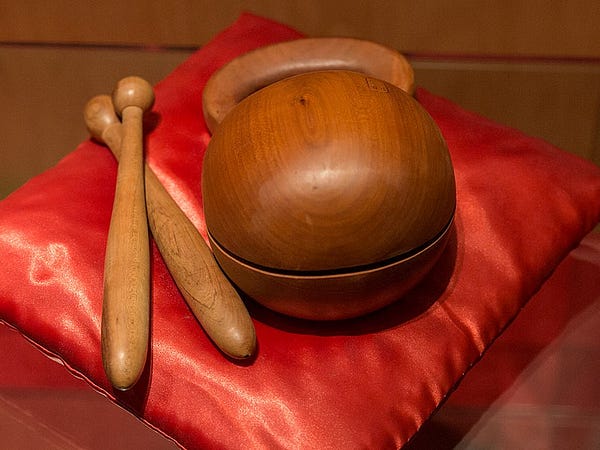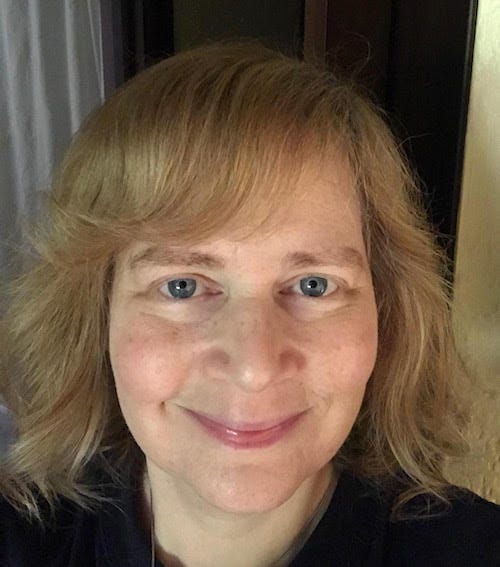On passing time in Detroit.
“I’m so sorry, I whisper to the silence all around.”

Where I live, COVID-19 has landed like a tornado. It staggers and sways through Detroit and beyond, so everyone deemed nonessential stays under cover when they can. The folks with access to cover, anyway.
As for my little family, we wait in our house for an all-clear that seems unlikely to come. Until we run low on groceries, or on kibble and those little cans of moist foulness for the cats, or the emergency Xanax that keeps me from clawing across my ceiling on bad days. And we sometimes take walks through our silent neighborhood, my husband, Steven, and I occasionally joined by nineteen-year-old Celia, who’s home from college. In this way we see firsthand how cars still prowl 7 Mile, though far fewer than before, how the slobbish woodpecker continues to drop his tree scraps across our walkway, and how the hundred-year oak withstands such relentless pecking and goes on reaching its branches toward heaven.
But mostly we hunker in our pretty house and count our privileges. As our neighbors get sick. As the hospitals fill with gasping people.
I’m sorry, I whisper to the sick ones, to the ones who don’t make it. I’m not sure why I do this.
But — I’m so sorry, I whisper to the silence all around.
? ? ? ?
To pass time, the cats and I perch at our front windows. We check out trees and sidewalks and overgrown grass within our scope, and if we’re lucky, a wild turkey or coyote will amble by. We swish our tails wildly at squirrels and birds, and prepare to pounce — never mind the glass separating us from the world
I scan our own patchy lawn with its tiny, purple violets, delicate as tissue paper (here today, gone tomorrow!). With its swath of dandelions (good for the bees), the first shoots of milkweed (good for monarch butterflies) and purple coneflowers (good for bees and butterflies).
This year, nobody’s around to give us the stink-eye. Not a soul comes by to complain.
? ? ? ?
Some mornings I meditate with Steven. My husband’s a Zen Buddhist whose ritual includes chanting, bowing, tapping of the moktak. All prior to his main event, the shutting down of movement one twitch at a time, the counting of breaths — how he goes still as an empty room. And how the air around him shines.
Then there’s me, who’s not much for ceremony. I inhale, exhale the nag champa incense, and squirm into my honest skin. I fold my legs, but not painfully so My hands cup to catch celestial energy — should some happen to float by — but if they come undone, it isn’t the end of the world. What matters is the hush, the open window in my brain leading to starless skies. I’ve never inhabited this place, never touched it with my spectral fingers, but I’ve caught hints, so I go on reaching —

until a cat drops like a sack of rocks into my lap; until she grumbles deep in her throat and sets to kneading my fuzzy robe. This cat with her claws, with the headbutting and licking, the nip on my arm when I refuse to move. How she flumps across my folded-but-not-painfully legs and purrs like a train clacking down the tracks.
If I remove her, she’ll return and begin her complicated ritual from the get-go. If I shout — Ohmygodleavemealoneforonce! — I’ll lose the hint of window altogether, and wander to the kitchen for a snack.
So I stay put, as does the cat. We inhale, exhale. I reach and reach toward the hush. I want it like an ancient lullaby I can almost, but not quite, call to mind. Like cool water on fevered skin.
? ? ? ?
After enjoying a light lunch of jellybeans (I like the black ones!) and chardonnay, it’s time for the work portion of the day. I head to my couch/office to grade essays about magical realism and post-colonial trauma in the Americas.
Steven, a high school chef instructor, bribes himself with little bowls of corn chips and raisins. He wedges into a corner of the dining room and remotely badgers his students to turn up or down their volume and follow recipes to the letter. Later, he’ll phone the parents of his perpetual no-shows, wearing his reasonable voice like a slouchy flannel the entire time.
Our daughter, Celia, sleeps until 4:00 p.m.
This is our life now.
? ? ? ?
When necessary, I run to the drugstore to grab milk or Xanax refills. I gather my mask and plastic gloves, my shopping beanie and glasses and the one jacket I wear outdoors, and drive at a jogger’s pace through deserted streets. Sometimes I turn my radio up up up and sing loud and off-key to Iggy Pop or Led Zeppelin or the Foo Fighters. I might laugh, too — more a seal’s bark than anything — because I’m so grateful to be out. On warmer days, I open my windows wide and let the air slap me silly, it being a good sort of hurt.
Until I reach the overpass at 8 Mile, where the men and women who live rough lean into the guardrails and hold out their cupped hands or point to their unreadable signs. I recognize a face or two, because once upon a time I bought them sandwiches and protein bars. I offered cash when I could, because who was I to judge how they might use it?
Now I shut my windows tight and don’t meet anyone’s eyes. I drive right past.
? ? ? ?
Celia emerges from her room in late afternoon, and she and I return to our current jigsaw puzzle, this one depicting Monet’s Giverny garden, a blurry version from the artist’s near-blind years.
Celia and I slide into our parallel places of focus, each of us shuffling puzzle pieces like playing cards between our fingers, holding them up to the light. Together and separately we match green to green to green. We build the omnipresent bridge, the dark water winking below. Our backs curve into question marks and still we concentrate. So that later, when we finally leave our chairs, we will groan like old, old men.
But not yet. Because we’re still finishing. We’re so close we can smell the lilies.
“I’ve got it,” calls Celia, relief thick in her voice. “We’re finished.”
Nearly finished. The final piece, surely another swirl of green, has dissolved to dust or vanished between the floorboards where it must have fallen. To be safe, we move napkins and stray plates, then crawl under the table with flashlights. We do this over and over. Finally, we quit.
But we can’t bring ourselves to break down the puzzle or move on, so our almost-garden remains for days, its missing piece like a window displaying the antique cloth beneath — the lace itself comprised of hundreds, thousands of thread-framed portals, tiny mysteries I can’t hope to penetrate.
? ? ? ?
Prior to coronavirus and lockdown, I already taught my college courses online and from home. In this way, little has changed for me. Even as the planet shudders to its core.
In both my literature and my creative writing classes, I note several students have disappeared like mirages from the discussion boards. I reach out via email, and once in a while they respond to my fretful notes with news of sickness or deaths in their families. One girl tells me she lost her housing and has no place to go. She’s nineteen, I believe. The same age as Celia.
I’m so sorry, I write in return. Please tell me where you are now. Please tell me when you land somewhere safe.
She never contacts me again.
? ? ? ?
Because we live in Detroit and no supermarket wants to deliver our fruits and cheese, jellybeans and wine, I tug my shopping beanie low over my forehead. I drive thirty-five minutes to a Kroger nestled in a fancy suburb with homes as charming and bright as confections, so I want to eat them up. I come out here for the excuse to drive, to feel the sun through the windshield if it’s a decent day, to breathe the rain smell if (more often) it’s not. And, too, this store is less crowded and better provisioned than ones closer to home.
When I arrive, the sliding doors open and shut with a small hiss, and an essential worker waves me toward a wiped-down cart. All my fellow shoppers observe one-way arrows on the floor; they allow me six feet of space. So far as I can tell, every single one is white and smiles beneath their mask.
The cashiers and shelf-stockers and baggers don’t smile so much, though I’m extra friendly to compensate. None of them wear masks, and, to a person, they’re brown or black. I’m sorry, I start to whisper, then I bite my already-covered lip to hold it in.
? ? ? ?
Last night I got into the candy corn I bought on a whim. The bag I tucked into the highest kitchen cupboard upon returning home from shopping (after undressing, throwing the outdoor clothes into the washer, showering, redressing. After Steven, Celia and I formed our production line to wipe down the counters, then the packages, then the counters again).
For hours, I ignored the tricolored delights. Until they called me in the dark with their siren’s wail, so I tore into the bag with my teeth. I blame boredom for this lapse. Or the spring rain dropping like bullets onto the roof of my house.
? ? ? ?
On Friday, our good governor orders everyone to wear masks in public places. She instructs essential businesses to provide them to workers and I’m enormously relieved. She also extends Michigan’s stay-at-home order for nearly three more weeks.
Celia slogs downstairs earlier than usual, it just being noon. Her face is crinkled in the pattern of her threadbare sheets, her mouth turned decidedly down. My girl’s been holding up well enough under the circumstances, but as dripping water will eventually break skin, so a soul can only take so much terrible news before it, too, begins to crack.
“What’s wrong?” I ask.
“So much,” she says. “Everything.”
True enough.
She starts again. “Aaron” — the boyfriend — “has a friend with a gun. I told him how women are more likely to be killed if their partners own guns. Aaron says I’m insulting his friend. Or maybe all men.”
“Does Aaron have a gun?”
“God, no!”
Good to know.
“But it’s more than that,” she says. “Everything seems ruined — my summer, next year, longer maybe. And I feel selfish for complaining.”
I nod because I get it. “What do you need to hear right now? Tell me how to help you.”
Celia just shakes her head. I grab her tight and we rock back and forth on the therapy couch.
Until she tells me she’s exhausted and trudges upstairs for a nap.
? ? ? ?
These nights I dream of airports, busy ones, as from the days before shutdown. I’m running late so I rush for the plane I’m about to miss. But the corridors reek of disinfectant and I stop to cough again and again. Or they stretch for miles or coil like snakes. Apparently I neglected to pack, my legs are weighed down by stones, and all the gate numbers have changed to hieroglyphics I can’t begin to decode.
The other travelers are similarly harried. They push me aside in their haste.
“Too close,” I shout. “It’s six feet, remember?”
The gate attendants search for my name in the flight registry. They’re weeping uncontrollably, backing slowly away. “Six feet,” they shout.
“But wait. I bought my ticket years ago. I know exactly how this is meant to go. I’ll show you the confirmation number.” I reach for my purse, but it’s misplaced, stolen, its slashed strap swinging like a noose from my shoulder.
And so it goes. Night after night the dreams come, and I fear I may never reach my destination.
? ? ? ?
My creative nonfiction students turn in their final assignments. Like slow, slow rain, the files trickle into my inbox over the course of an afternoon.
I put off reading for as long as I can. When I finally bribe myself back to my couch/office with little bowls of jellybeans and candy corn, I find page after page of loss, the fear rising like ocean tides. There are blacked-out windows, faces with bandanas for mouths, streets like echo chambers.
It’s by far the best writing I’ve seen all semester.
? ? ? ?
Though I know it’s a bad idea, I weigh myself the next morning. The scale numbers spin like crazy beneath their glass window and when they finally stop, I’m up three pounds. Which doesn’t matter, of course; it makes no difference in the world.
It’s like a train tearing through my house with its terrible din. Like the chaos the runaway train leaves in its wake. That’s how distraught I feel.
I understand this makes no sense.
I wallow through this mess for the rest of the day.
? ? ? ?
At Steven’s urging, I give meditation another go. While Celia frets in her sleep so I can hear it downstairs, and Steven breathes and shines beside me, I fidget like a toddler.
The cat, already sprawled across my folded legs, purrs prodigiously, the sound pounding like a jackhammer, her complete body vibrating with joy.
I tremble along, tumbling head over fist into cacophony. A Technicolor trance in place of the silent darkness and empty window I’m meant to inhabit. In this newborn landscape, my thoughts rush like lightning across the sky, passing too quickly for me to catch a single slice.
Which is fine. If it matters, it’ll loop back eventually. In the meantime, I make of this what I can.
I make of this what I can.
***************************************************

Laura Bernstein-Machlay’s work has appeared in many magazines, including The American Scholar, The Coachella Review, Hotel Amerika, Into the Void, Michigan Quarterly Review, New Plains Review, World Literature Today, and others. Her full-length collection of creative nonfiction essays, Travelers, was named a finalist in Foreword Review’s INDIE book award.








